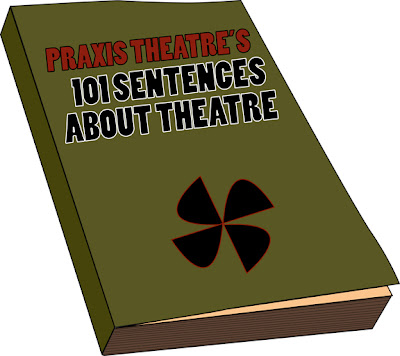Sentences 15-19
15) Unable to turn away from what is disturbing or triumphant, one feels complicit somehow, the journey is real yet imagined and accepted because we are all here at once taking it all in together.
16) Bad theatre is a particularly embarrassing form of public self-flagellation.
17) The basic moral outline of Christianity and, therefore, society’s principal template, has blatantly shown us how to repress our feelings and fall back or rely on a state of emotional denial; while theatre shows us how to identify and exhume that specified and odious feeling, to scrutinize its causes and origins, and then simply to express it.
18) Theatre is not an empirical science.
19) The power of theatre is exemplified when artists answer a production they disagree with, or just plain didn’t like, with “I can do that better” – and when they actually get off their asses and do it.
Click here for the series introduction and for a complete list of sentences so far.



firmly against #16:
the only way to create truly awesome theatre, is to risk creating truly horrible theatre. this can sometimes result in “embarassing” public displays. but so it goes…the alternative is to create pedestrian mildly satisfying productions that take no risks.
“Pedestrian, mildly satisfying productions that take no risks” is bad theatre Mike. And I, for one, find it “particularly embarrasing.”
Your statement here assumes a definition of “bad theatre” that is no implicit to the sentence itself.
Ian,
You misinterpret me…I agree with your defintiion of bad theatre. better to go down in flames. i’d rather a bang than a whimper. I think the sentiment is implicit in the sentence however, because if you go out on a limb and fail it isn’t self-flagellation, it’s just trying and failing.
In this context, self-flagellation suggests, “excessive self-criticism”. So, rewritten, the sentence could be:
“Theatre that takes no risks is a particularly embarrasing form of public and excessive self-criticism.”
I think the argument here is that “excessive self-criticism” is itself a crutch that can cause bad theatre because it prevents the artist from taking positive action. The key is that the self-criticism is excessive. It paralyzes the artist, and their paralysis leads them to the safety of the status quo. In other words, bad theatre takes no risks because it cannot withstand the scruity of its own overbearing self-criticism. It looks too deeply inward when it should be looking outward.
OK. So who’s embarrassed by all this “no risk taking”? I think the sentence suggests that we should all be embarrassed by it.
To me, this is this idea at the heart of sentence #16.